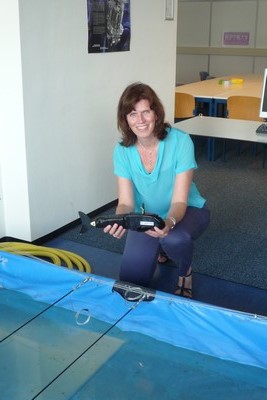Robotic fish, cruise control and Johann Bernoulli
It may not cross your mind as your car zooms along on cruise control, but such a system is brimming with mathematics. The mathematics of control theory will be the focus of an international conference in Groningen at the start of July. Groningen mathematician Johann Bernoulli laid the foundation for this theory, which is the subject of the 25th Johann Bernoulli lecture on 8 July.

What is the link between a school of fish and a modern electricity network? The question might seem absurd, but these really do appear next to each other on a poster that hangs in the Institute for Technology Engineering and Management (ITEM) of the University of Groningen.
‘The mathematical rules governing how fish swim together in a school were the source of inspiration for us when we described a smart grid , a network that evenly balances electricity supply and demand’, explains Professor of Discrete Technology and Production Automation Jacquelien Scherpen.
Mathematics is essential to society, but is often hidden under the bonnet. Sometimes literally, like the cruise control system that enables the car to retain a constant speed, even if it needs to cross a viaduct. ‘And what is more, this is done in a way that is comfortable for the passengers, which means without jolts.’ The students and scholars in Scherpen’s group and institute are working on very different projects that involve, for example, getting little robots to work together or controlling a mechanical arm – and the development of smart grids.

‘Our work is based on fundamental mathematical theories’, Scherpen explains, ‘which we use for a certain application.’ This is how households with an energy supply (from solar panels or micro combined heat and power boilers ) or demand can suddenly resemble a school of swimming fish.
Scherpen, who studied applied mathematics at the University of Twente, does not only focus on applications: ‘We also develop mathematical principles. They are by no means complete.’ One of her PhD students, for example, is working on an operating system for autonomous robots that inspect dykes. ‘They need to move along the dyke as economically as possible. The mathematics to describe that didn’t yet exist. We had to develop it.’ She is collaborating with Arjan van der Schaft from the Johann Bernoulli Institute for Mathematics and Computer Science on this project.
From 7 to 11 July more than 400 mathematicians and engineers who study the mathematics of control theory will be in Groningen for the 21st International Symposium on Mathematical Theory of Networks and Systems (MTNS2014). Scherpen is on the organizational committee. ‘It’s the third time that this conference is taking place in the Netherlands, and it’s an honour that it’s in Groningen, but also recognition for the good work that we do here.’
During the conference there will be an open session in memory of Groningen Professor of System and Control Theory, Jan Willems , a pioneer in this field who died last year. There will also be a public lecture in which Héctor Sussmann will explain how a distant predecessor of Willems, Johann Bernoulli, once laid the foundation for ‘optimal control theory’, one of the fundamental theories of system and control theory.
‘Sussmann is an expert in the field. If it weren’t for him, the foundations of the discipline would be much shakier’, says Scherpen. Sussmann also worked on the mathematical underpinning of the ‘regularity’ and ‘analyticity’ of more complex systems. Scherpen: ‘Regularity is about interaction with the environment, the way in which systems can respond to it. And analyticity is the sensor side: what can you see of the system? How can you use this information?’
UPDATE 2 July: Unfortunately, Héctor Sussmann had to cancel his lecture for personal reasons. The organization are happy to announce they have found Roger Brockett of Harvard University willing to give a lecture on 'Robust Synchronization: From Huygens to Current Applications'.
This public Johann Bernoulli lecture will take place on Tuesday 8 July, the day of the first semi-final of the World Cup. This begins long after the lecture finishes, however. The organizers of the conference have also taken the football schedule into account, says Scherpen. ‘Four years ago there was a dinner cruise on the Danube, but Spain was playing Germany in the semi-final of the World Cup in South Africa during the dinner. At the last minute, the organizers set up a screen in a small room, for the German and Spanish conference attendees. We wanted to avoid this.’ The traditional dinner is thus not on the Wednesday (when the second semi-final is to take place) but the Thursday.
The Groningen organizers of the MTNS 2014 are Arjan van der Schaft, Harry Trentelman (both from the Johann Bernoulli Institute for Mathematics and Computer Science), Jacquelien Scherpen and Claudio De Persis (both from the Institute of Technology, Engineering and Management).
| Last modified: | 11 February 2025 2.37 p.m. |
More news
-
25 April 2025
Leading microbiologist Arnold Driessen honoured
On 25 April 2025, Arnold Driessen (Horst, the Netherlands, 1958) received a Royal Decoration. Driessen is Professor of Molecular Microbiology and chair of the Molecular Microbiology research department of the Faculty of Science and Engineering at the...
-
24 April 2025
Highlighted papers April 2025
The antimalarial drug mefloquine could help treat genetic diseases such as cystic fibrosis, Duchenne muscular dystrophy, as well as some cancers.
-
22 April 2025
Microplastics and their effects on the human body
Professor of Respiratory Immunology Barbro Melgert has discovered how microplastics affect the lungs and can explain how to reduce our exposure.
